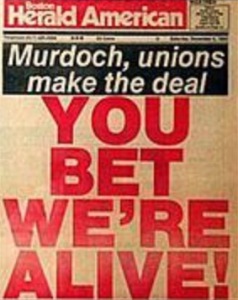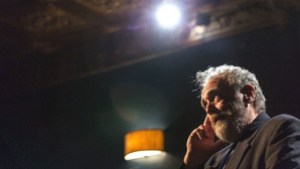 Sabrina Rubin Erdely, the journalist at the heart of the Rolling Stone rape-story scandal, harbored doubts about “Jackie,” her principal source, all along — or, at the very least, had come to doubt her by the time the story was published.
Sabrina Rubin Erdely, the journalist at the heart of the Rolling Stone rape-story scandal, harbored doubts about “Jackie,” her principal source, all along — or, at the very least, had come to doubt her by the time the story was published.
That’s the only way I can make sense of a remarkable section that appears fairly early in the Columbia Journalism Review’s 12,000-word report on Rolling Stone’s article about a gang rape at the University of Virginia for which there turned out to be no credible evidence. The report was written by Steve Coll, dean of Columbia’s Graduate School of Journalism; Sheila Coronel, dean of academic affairs; and Derek Kravitz, a postgraduate researcher. According to the report:
A week after publication, on the day before Thanksgiving, Erdely spoke with Jackie by phone. “She thanked me many times,” Erdely said. Jackie seemed “adrenaline-charged … feeling really good.”
Erdely chose this moment to revisit the mystery of the lifeguard who had lured Jackie and overseen her assault. Jackie’s unwillingness to name him continued to bother Erdely. Apparently, the man was still dangerous and at large. “This is not going to be published,” the writer said, as she recalled. “Can you just tell me?”
Jackie gave Erdely a name. But as the reporter typed, her fingers stopped. Jackie was unsure how to spell the lifeguard’s last name. Jackie speculated aloud about possible variations.
“An alarm bell went off in my head,” Erdely said. How could Jackie not know the exact name of someone she said had carried out such a terrible crime against her — a man she professed to fear deeply?
Over the next few days, worried about the integrity of her story, the reporter investigated the name Jackie had provided, but she was unable to confirm that he worked at the pool, was a member of the fraternity Jackie had identified or had other connections to Jackie or her description of her assault. She discussed her concerns with her editors. Her work faced new pressures. The writer Richard Bradley had published early if speculative doubts about the plausibility of Jackie’s account. Writers at Slate had challenged Erdely’s reporting during a podcast interview. She also learned that T. Rees Shapiro, a Washington Post reporter, was preparing a story based on interviews at the University of Virginia that would raise serious doubts about Rolling Stone’s reporting.
Late on Dec. 4, Jackie texted Erdely, and the writer called back. It was by now after midnight. “We proceeded to have a conversation that led me to have serious doubts,” Erdely said.
You can see the problem. The story had already been published and had created a sensation. “I was shocked to have a story that was going to go viral in this way,” Erdely told the report’s authors. “My phone was ringing off the hook.” And Erdely felt queasy enough about what she had written that she was still bugging Jackie for the name of the guy who led the gang rape she claimed to have been subjected to at a UVA fraternity house.
From the time that Erdely’s story unraveled, I’ve been wondering what lessons journalists could take away from Rolling Stone’s institutional failures. Those failures were so profound and so basic that it’s hard to know how we can even look at this as a teachable moment. The lesson is “don’t do any of this.” As the CJR report makes clear:
- Erdely had just one source, Jackie, for her account of the gang rape.
- She made no more than a passing attempt at interviewing the alleged rapists — and, as we have seen, she never did find out the name of the supposed ringleader.
- She also did not interview three friends of Jackie’s who supposedly spoke with Jackie shortly after the rape. As the author’s reports note, that stands out as the key failure, since they would have debunked many of the details, which in turn would likely have led to the unraveling of the entire story.
Jay Rosen of New York University has posted a must-read analysis of the CJR report. He writes, “The most consequential decision Rolling Stone made was made at the beginning: to settle on a narrative and go in search of the story that would work just right for that narrative.” Making the facts fit the story, in other words.
In reading the full CJR report, I think there are two other major problems: an understandable instinct to believe the victim (while less understandably ignoring the small internal voice saying, “No, wait, there’s something wrong here”). And a culture inside Rolling Stone that for whatever reason did not allow the story to be derailed even though everyone involved knew there were problems.
Sexual assault on campus is an enormous problem. I know there are those who question the oft-cited statistic that 20 percent of female students are victims. But whatever the true number is, it’s too high. Rolling Stone’s failures have set back efforts to do something about it. So I’ll close by noting that the CJR quotes my former Boston Phoenix colleague Kristen Lombardi on the right way to do this kind of reporting. Lombardi’s work in this area for the Center for Public Integrity truly represents the gold standard. From the report:
Problems arise when the terms of the compact between survivor and journalist are not spelled out. Kristen Lombardi, who spent a year and a half reporting the Center for Public Integrity’s series on campus sexual assault, said she made it explicit to the women she interviewed that the reporting process required her to obtain documents, collect evidence and talk to as many people involved in the case as possible, including the accused. She prefaced her interviews by assuring the women that she believed in them but that it was in their best interest to make sure there were no questions about the veracity of their accounts. She also allowed victims some control, including determining the time, place and pace of their interviews.
If a woman was not ready for such a process, Lombardi said, she was prepared to walk away.
In “The Elements of Journalism,” Bill Kovach and Tom Rosenstiel write, “In the end, the discipline of verification is what separates journalism from entertainment, propaganda, fiction, or art.”
Sabrina Rubin Erdely and her colleagues at Rolling Stone trusted (sort of) but did not verify.
This commentary also appears at WGBHNews.org.







